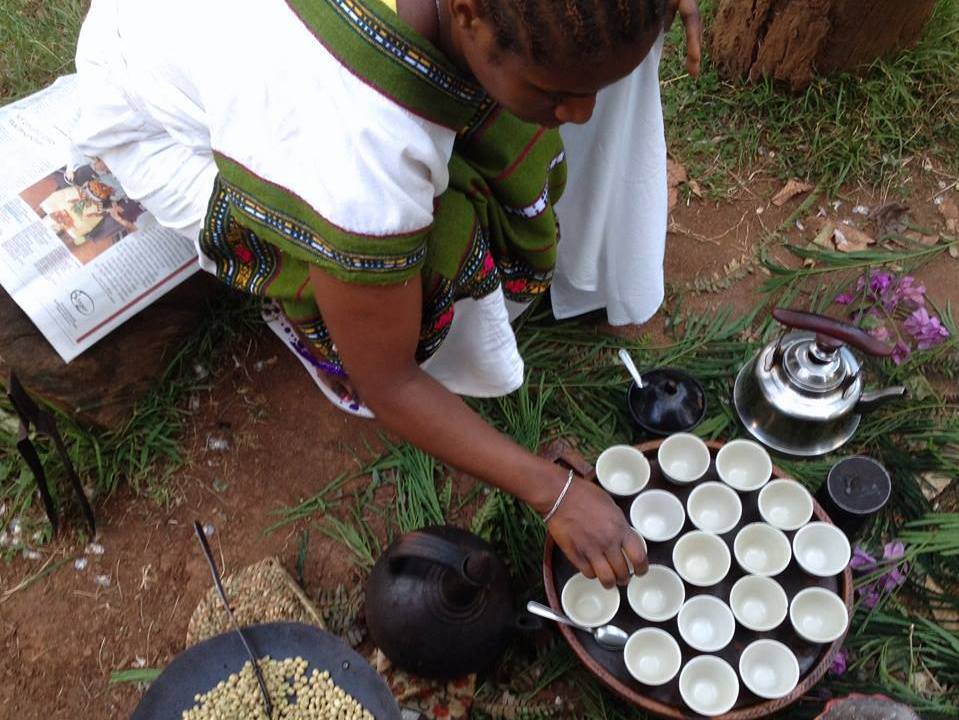
Enlarge this image
"Coffee nerd, MC and entrepreneur" Bartholomew Jones holds a green, yet-to-be-roasted coffee bean at his North Memphis storefront, Cxffeeblack. Andrew Puccio/Courtesy of Cxffeeblack hide caption
toggle caption Andrew Puccio/Courtesy of Cxffeeblack
"Coffee nerd, MC and entrepreneur" Bartholomew Jones holds a green, yet-to-be-roasted coffee bean at his North Memphis storefront, Cxffeeblack.
Andrew Puccio/Courtesy of CxffeeblackFor most people in the United States, coffee is synonymous with chains like Starbucks, or third wave cafes boasting Panamanian pour overs — not necessarily the continent of Africa.
But the place where coffee originated, and where the most diverse varieties of coffee thrive, is Ethiopia and South Sudan, as recently confirmed by a research team led by coffee genetics expert and president of the International Women's Coffee Alliance Sarada Krishnan.

Enlarge this image
A coffee grower in Ethiopia performs a traditional coffee ceremony. Simran Sethi/Simran Sethi hide caption
toggle caption Simran Sethi/Simran Sethi
A coffee grower in Ethiopia performs a traditional coffee ceremony.
Simran Sethi/Simran SethiThese countries are important from a scientific perspective, Krishnan explains, because they are a link to coffee's past and hold the genetic traits that, under climate change, are the keys to sustaining coffee's future.
But what also should be celebrated, she says, is that the region also gave the world the culture of coffee. "Before coffee spread into Yemen and around the world, drinking coffee was a communal event celebrated in Ethiopia."
This connection is something Kenfe Bellay, the owner of Washington D.C.'s landmark coffeehouse Sidamo Coffee and Tea, knows well. For the last 16 years, he has been sharing the ritualized form of consumption — known as the coffee ceremony — with visitors, helping them understand the deeper meaning coffee holds for his homeland. In the United States, he says, "you grab coffee and you run. But in Ethiopia, they don't want to finish it so fast. They want to have more time to talk each other, to exchange information, and to enjoy their coffee."

Enlarge this image
Kenfe Bellay, owner of Washington, D.C.'s Sidamo Coffee and Tea in his coffee shop's outdoor patio. Simran Sethi/Simran Sethi hide caption
toggle caption Simran Sethi/Simran Sethi
Kenfe Bellay, owner of Washington, D.C.'s Sidamo Coffee and Tea in his coffee shop's outdoor patio.
Simran Sethi/Simran SethiIn the traditional coffee ceremony, neighbors are called, frankincense is burned, and fresh green coffee beans are passed around for everyone to inspect before they are roasted to a deep brown on a flat, cast-iron griddle. As the coffee is prepared, Bellay explains, people catch up on information about the community and the world around them. "Coffee is not only to drink. The main part is the social [element] where anything—including the gossip—can be discussed."
After the roasted beans cool, they are typically ground with a mukecha and zenezena (mortar and pestle) and boiled in a clay coffee pot with a long, thin neck (resembling ones favored for pour overs) known as a jebena. The boil, he says, concentrates the flavor.













